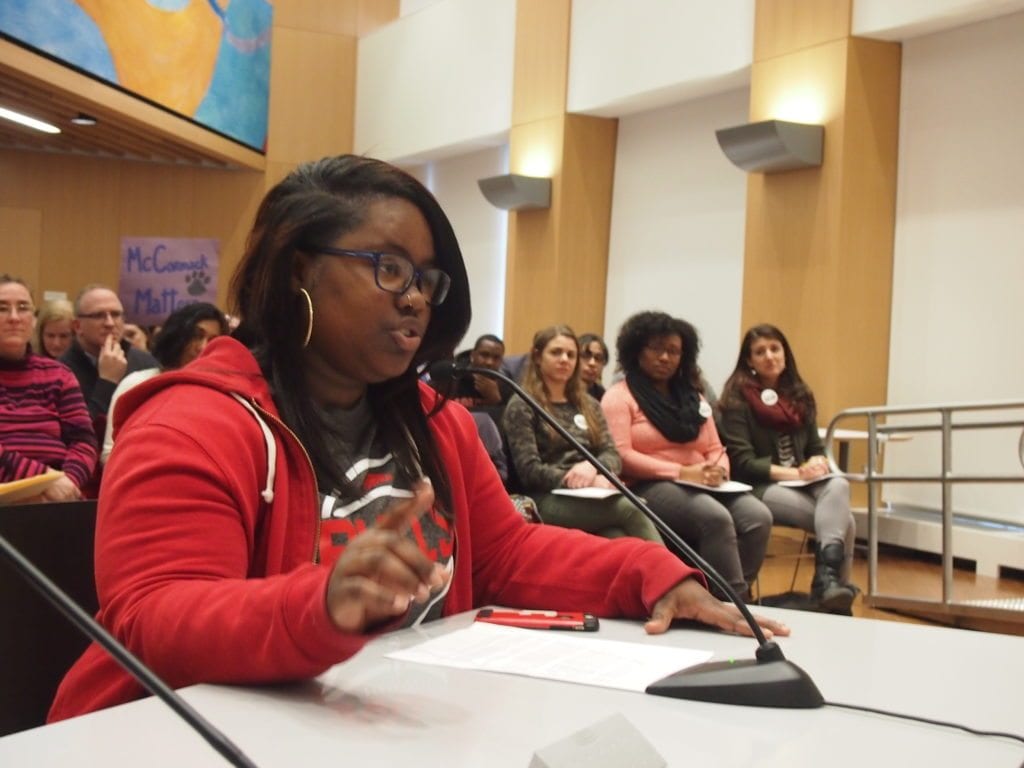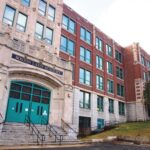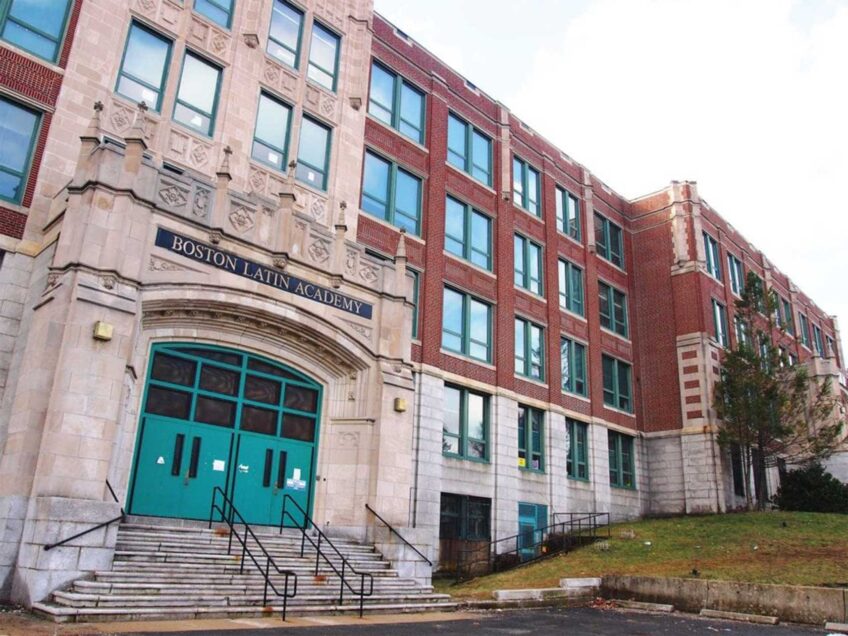
Yawu Miller
Cuts to schools dominated the debate during last night’s Boston School Committee meeting. Students, parents and teachers appealed for more funding in the final meeting before the body votes next week on the proposed $1.061 billion budget.
“My school losing over half a million dollars scares me,” said Urban Science Academy senior Joe Okafor. “Although I would not be directly affected, being a senior, students I know would have to lose teachers, great teachers that they’ve built strong connections with.”
Located in West Roxbury, Urban Science Academy is one of 49 schools that together would lose $13 million in funding. Although the fiscal year 2018 budget contains $29 million in added funding, according to BPS officials, new programming will cost upwards of $20 million, leaving little new money to cover existing costs.
School Committee Chairman Michael O’Neil told meeting attendees that the total allocation for the schools is increasing by 3.9 percent, a figure that apparently includes the $20 million the city set aside for collective bargaining.
City Councilor Tito Jackson said BPS has made the budget more difficult to understand by including the collective bargaining funds, which will not be part of next year’s operating budget if the city and school staff unions do not reach an agreement.
“Schools are on the receiving ends of very deep cuts,” he said. “There are dozens of schools being cut — the Dever, the Tynan, the Timilty, Urban Science Academy, Edison, Channing, Hennigan, West Roxbury Academy, Burke, Grew — and that’s just some of them. That is the sound of Boston’s opportunity gap widening.”
The majority of the schools in the BPS system will see modest increases under the student-weighted funding system, in which funds are allocated to schools according to the number of students they enroll. Schools that have declining enrollments are seeing their funding drop.

Tito Jackson
But while the district’s Office of Opportunity and Achievement Gaps is slated for a modest increase in funding, members of the BPS-convened Opportunity and Achievement Gaps Task Force took a strong stand against the budget.
“The OAG Task Force is opposed to the 2017-2018 budget as it is currently written because it will have a negative impact on the district’s efforts to eliminate opportunity and achievement gaps, particularly for students attending low-performing schools,” said task force member Ayele Shakur, reading from a statement. “By using the current Weighted Student Funding Formula as its foundation, the SY18 budget systematically disinvests in the district’s lowest performing schools that have the greatest needs.”
Shakur and others noted that many of the schools most adversely affected by budget cuts are in low-income neighborhoods and serve high populations of low-income, special needs and English language learners.
Among those schools receiving cuts are six designated Level 4 by the state Department of Elementary and Secondary Education and one Level 5 school. Shakur argued that lower-performing schools and schools with higher-need students should receive more per-pupil funding than what the current student-weighted system allows.
“Under the current funding formula, BPS creates policies that lead to under-enrollment, and then penalizes schools for this under-enrollment,” she said. “What results is a vicious cycle where the district’s lowest performing schools are forced to make drastic cuts year after year as enrollments plummet, until they are ultimately starved out of existence.”
A contingent of parents and teachers from the John W. McCormack Middle School, due to receive a $935,000 cut, took turns testifying about their school’s plight. While the McCormack is rated by DESE at Level 3, several of its teachers argued that when the city turned one of its main feeder schools into a K-8, enrollment began to drop, precipitating a $1.9 million decline in funding over four years.
Teacher Brett Gormley said the cuts would force the McCormack school to shed ten teachers, even as student performance at the school grows faster than at any other school in the city.
“I see a great building with great teachers,” he said. “We’re not utilizing the school as best we can as a district.”
Weighted student funding creates a zero-sum game where some schools grow at the expense of others. Students, parents and teachers at Boston Community Leadership Academy voiced fear that their next-door neighbor, New Mission High School, would grow at their expense.
BCLA students found out the high school, which shares a building with them, was expanding to include 7th and 8th grades through a post on New Mission’s Facebook page. While BPS Superintendent Tommy Chang said there is no plan to subtract space from BCLA, teachers and students seemed convinced the New Mission would cut into their space. Last year the school, which has a high population of autistic students, saw its budget cut deeply as per-pupil allocations for students with autism were adjusted downward.
School Committee member Miren Uriate compared BCLA’s plight to that of the Margarita Muniz school, which lost space to the Mission Hill School.
“You’re pitting schools against one another when we may have other options,” she said.
Representatives of the Opportunity Gaps Task Force and Black Educators of Massachusetts called on the school department to adopt reforms before cutting school budgets. These include a requirement that principals provide “achievement gap impact statements” outlining the possible outcomes if their budgets are reduced; a requirement that BPS provide parents with “school impact statements” detailing how budget cuts will affect their schools and a requirement that principals in Level IV school provide an assessment of how budget reductions will affect their turnaround plans.
BEAM President Johnny McInnis testified in a March 1 School Committee meeting that the budget violated the committee’s Office of Opportunity Gap policy by “systematically disinvesting in low-performing schools that are attended disproportionately by students of color.”
Jackson said the cuts come on top of years of disinvestment that have led to schools closing libraries — thereby risking loss of accreditation — as well as cutting arts and music.
“The Boston school budget before us is a failure,” he said. “It fails to pass the School Committee’s own achievement gap policy. Instead it widens the gap. It fails the students who are in the dozens of schools who are seeing cuts.”
School Committee members are scheduled to vote on the budget at next Wednesday’s School Committee meeting.







